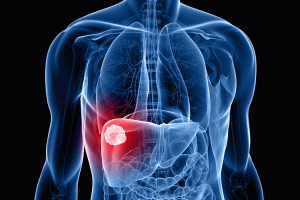
The most common type of liver cancer, hepatocellular carcinoma (HCC), is already the third leading cause of cancer-related deaths globally—and cases are on the rise, both in the U.S. and worldwide.
While chemotherapy, surgery and liver transplants can help some patients, targeted treatments for HCC could save millions more lives.
Recent studies have offered clues about one potential target: the circadian clock proteins inside cells, which help coordinate changes in the body’s functioning over the course of a day.
But most of this research only hints at an indirect link between circadian clock function and HCC, for instance the observation that cells collected from patients with liver cancer have disrupted circadian rhythms.
Now, a study led by researchers at the Keck School of Medicine of USC not only directly links circadian clock proteins to liver cancer, but also shows precisely how cancer cells hijack circadian clock machinery to divide and spread.
The research, just published in the journal Proceedings of the National Academy of Sciences, also found that inhibiting key clock proteins can prevent cancer cells from multiplying.
“Earlier studies didn’t give us a real handle on how we could use a specific treatment to target processes within liver cancer cells. In this paper, we’re making the first steps towards that,” said the study’s senior author, Steve A. Kay, PhD, University and Provost Professor of Neurology, Biomedical Engineering and Quantitative Computational Biology at the Keck School of Medicine of USC and director of the USC Michelson Center for Convergent Bioscience.
The research is a collaboration between cell biology experts and clinicians at the USC Norris Comprehensive Cancer Center, which is known for its leadership in clinical trials for various cancers, including HCC.
“We are very excited to find a new, innovative treatment strategy that may ultimately improve outcomes for patients with liver cancer,” said Heinz-Josef Lenz, MD, a professor of medicine and preventive medicine, associate director for clinical research and co-leader of the Gastrointestinal Cancers Program at USC Norris. “By targeting the circadian clock, we are not only targeting tumour cells but also the area around the tumour, which can help increase the efficacy of other targeted treatments.”
Interrupting the cell cycle
To elucidate the role of circadian clock proteins in HCC, Kay, Lenz and their colleagues conducted a series of experiments, using a combination of cell culture, genomic analysis and animal models.
First, the researchers showed that two key clock proteins, known as CLOCK and BMAL1, are critical for the replication of liver cancer cells in cell culture. When CLOCK and BMAL1 are suppressed, cancer cells’ replication process was interrupted—ultimately causing cell death, or apoptosis.
Triggering apoptosis, during which a cell stops dividing, then self-destructs, is the goal of many modern cancer treatments.
Next, the team drew on their tool chest of genomic samples, built through years of research on circadian clock proteins in the body, to further understand the role of CLOCK and BMAL1.
Among other findings, they showed that eliminating the clock proteins reduced levels of the enzyme Wee1 and increased levels of the enzyme inhibitor P21.
“That’s exactly what you want, because when it comes to cancer cell proliferation, P21 is a brake and Wee1 is a gas pedal,” said Kay, who also co-directs the USC Norris Center for Cancer Drug Development.
Finally, the researchers tested their findings in vivo.
Mice injected with unmodified human liver cancer cells grew large tumours, but those injected with cells modified to suppress CLOCK and BMAL1 showed little to no tumour growth.
Developing targeted therapies
Understanding how cancer cells hijack circadian clock proteins is a big step towards halting the spread of liver cancer, but the researchers have more questions to answer.
For example, Kay and his team hope to explore the relationship between circadian clock proteins, Wee1, and the P53 gene.
The gene helps prevent the growth of tumours in the body, and mutations in P53 have long been linked with a heightened risk for various cancers.
“We really need to understand that relationship to better identify which patients might benefit most from a targeted therapy against CLOCK and BMAL1,” Kay said.
He and his team also hope to begin testing experimental drugs that can target CLOCK and BMAL1 in patients with liver cancer.
The work is part of their larger body of research that analyses circadian clock proteins in several types of cancer, including glioblastoma, leukaemia and colorectal cancer.
Source: Keck School of Medicine of USC
We are an independent charity and are not backed by a large company or society. We raise every penny ourselves to improve the standards of cancer care through education. You can help us continue our work to address inequalities in cancer care by making a donation.
Any donation, however small, contributes directly towards the costs of creating and sharing free oncology education.
Together we can get better outcomes for patients by tackling global inequalities in access to the results of cancer research.
Thank you for your support.